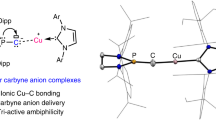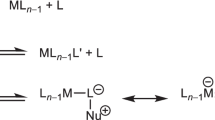Abstract
THE ligand 2,2′-dipyridyl (DP), its derivatives and analogues form an extremely interesting and important class of ligands. Their complexes possess some particular properties, presumably as a consequence of π-electron system of the ligand. To elucidate the role of the π-electron system, the study of complex-forming properties of the reduction product of 2,2′-dipyridyl was undertaken. Although we are at the very beginning of a systematic investigation, nevertheless, we achieved some results worthy of publication.
This is a preview of subscription content, access via your institution
Access options
Subscribe to this journal
Receive 51 print issues and online access
$199.00 per year
only $3.90 per issue
Buy this article
- Purchase on Springer Link
- Instant access to full article PDF
Prices may be subject to local taxes which are calculated during checkout
Similar content being viewed by others
References
Perkampus, H. H., and Köhler, H., Z. Elektrochem., 64, 365 (1960).
Irving, H., and Griffiths, J. M. M., J. Chem. Soc., 213 (1954).
Author information
Authors and Affiliations
Rights and permissions
About this article
Cite this article
BECK, M., HALMOS, M. Stability Constant of Copper (II) Complexes of Reduction Products of 2,2′-Dipyridyl. Nature 191, 1090–1091 (1961). https://doi.org/10.1038/1911090b0
Issue Date:
DOI: https://doi.org/10.1038/1911090b0
This article is cited by
-
Potentiometric Studies of Copper(II) Complexes of Some Substituted Benzylidene-2-Hydroxyanilines in Dioxane?Water Media
Journal of Solution Chemistry (2004)
Comments
By submitting a comment you agree to abide by our Terms and Community Guidelines. If you find something abusive or that does not comply with our terms or guidelines please flag it as inappropriate.



